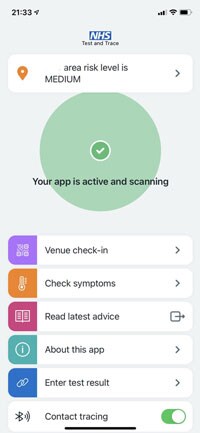These are the UK coronavirus stories you need to know about today.
Second Surge Surgery Planning
The Royal College of Anaesthetists (RCoA) has produced new guidance on preparing surgical services for a second wave of COVID-19.
The key areas covered include:
- Staffing levels and training
- Ensuring that there is sufficient space to maintain planned surgery whilst coping with critical care patients
- Ensuring there are sufficient stocks of PPE, drugs, and other essentials
- Reviewing and updating first wave guidelines
RCoA President, Professor Ravi Mahajan commented: "With the number of confirmed cases of COVID-19 rising rapidly, it is key that hospitals prepare now for a second surge. Whilst we were able to provide excellent care for patients with COVID-19 during the first surge, the suspension of planned services had potentially severe consequences for thousands of people, many of whom are still waiting for their treatment."
GP Diagnoses 'Halved' Under Lockdown
Diagnoses of common conditions in general practice halved during the COVID-19 lockdown, according to research presented at the ESCMID Conference on Coronavirus Disease, and published in The Lancet Public Health.
Between March 1 and May 31 2020 in Salford, Greater Manchester, there were 50% fewer first diagnoses of common mental health problems, 43.3% fewer circulatory system diseases diagnosed, and 49% fewer type 2 diabetes diagnoses.
The authors wrote: "Most of the conditions included in our study develop over many years, so it is unlikely that people's behaviour during the COVID-19 pandemic has resulted in a lower incidence of these diseases. The reduced number of new diagnoses observed when compared with the expected numbers obtained from our models are most likely to represent a large number of true disease cases that have gone undetected, undiagnosed, and untreated."
Royal College of GPs' Chair Professor Martin Marshall commented: "The fall in consultations is likely due to a number of factors, including patients having concerns about accessing GP services due to fear of contracting the virus or overburdening NHS services – and a desire to follow official messaging to stay at home to help stop the spread of COVID-19. Many specialist services were also restricted, so GPs might not have always been able to make referrals except in urgent cases."
Vaccine Mistrust
UCL's continuing COVID-19 Social Study of 70,000 participants finds 22% of people are unlikely to have a COVID-19 vaccine when it becomes available. Ten percent were 'very unlikely' and 49% were 'very likely' to have it.
Vaccine unforeseen effects were a concern for 53%, 30% believe that vaccines can cause future undiscovered problems in adults or children, and 15% don't think vaccines work.
Lead author, Dr Daisy Fancourt, said in a statement: "A worrying amount of respondents have said that not only will they not get the vaccine, but that they don’t believe vaccines work or worry about potential side-effects, concerns that lack any basis in fact.
"It is critical the Government and public health bodies publicise the importance of getting a vaccination, and explain why it will be critical in fighting the virus and protecting society."
The Government has confirmed reports that vaccine challenge trials are being considered. A spokesman said discussions around challenge trials were ongoing as part of the overall consideration of potential avenues for coronavirus research.
Meanwhile, the BBC reported GP surgeries and pharmacies are having to limit flu jabs to the most at-risk groups due to increased demand.
Test and Trace
Almost three times as many people in England are now testing positive for COVID-19 than there were at the end of August, latest data from Test and Trace show.
Turnaround times for in-person swab tests have worsened with 52.9% of results received the day after testing.
Of the positive tests transferred for contact tracing, 77.7% were reached. Taking into account all contacts identified, 74.7% were reached.
Today's UK COVID-19 data was not available at the time of publication.
App Goes Live

England and Wales' contact tracing app went live on the Apple and Google app stores late last night.
It uses secure and anonymous Bluetooth technology developed by the two companies to alert users if they've been close to someone who later tests positive. There are also NHSX enhancements, like QR codes for venues.
Most of the UK's mobile networks will allow free data use for the app's activity.
Wales' Health Minister Vaughan Gething said the app "will complement our existing contact tracing and testing services and will further support our co-ordinated response to COVID-19 at both a local and national level".
Royal College of Physicians President Professor Andrew Goddard commented: "The NHS COVID-19 app is a step in the right direction but ongoing evaluation and improvement will be important to ensure it is fit for purpose and ultimately works in a clinical setting. Feedback from users must be acted on quickly."
Separate apps for Scotland and Northern Ireland were already available.
Bone Marrow Immune Cells' Role in COVID-19
Monocytes released into the blood from bone marrow have abnormal features in COVID-19 patients, according to University of Manchester research published in Science Immunology.
Senior author Dr John Grainger said in a news release: "Our work once again highlights the importance of the innate immune system in COVID-19, we’re excited to be able to finally share the results of our study and hope that it can better inform treatments for this devastating disease."
Big Drop in Cancer Research Spending
Cancer research charities are predicting a 46% (£167m) drop in spending on projects, due to COVID-19, according to the National Cancer Research Institute (NCRI).
Charities account for more than half of publicly funded cancer research in the UK.
The greatest impact will be seen on research focussed on specific cancer types, the NCRI said.
See more global coronavirus updates in Medscape’s Coronavirus Resource Centre.




